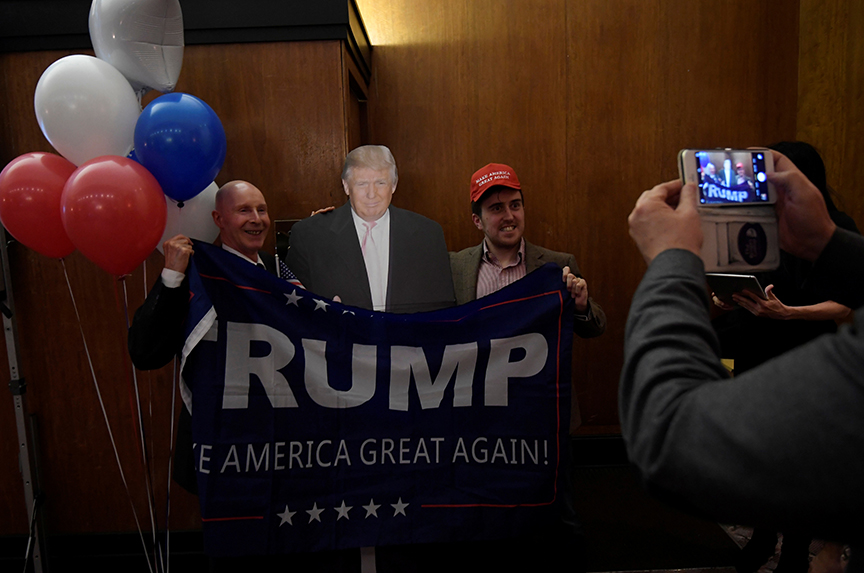 It’s not a secret that expatriate Americans, along with Europeans, tend to feel more closely aligned with the Democratic Party in the United States. Even when overseas liberals supposedly “fell out of love” with Barack Obama or didn’t, more recently, adore Hillary Clinton as much as they had her husband, there’s no contest between any Democratic candidate and a Republican when it comes to popularity in Europe.
It’s not a secret that expatriate Americans, along with Europeans, tend to feel more closely aligned with the Democratic Party in the United States. Even when overseas liberals supposedly “fell out of love” with Barack Obama or didn’t, more recently, adore Hillary Clinton as much as they had her husband, there’s no contest between any Democratic candidate and a Republican when it comes to popularity in Europe.
Democrats Abroad boasts a healthy contingent of active members in major European capitals, staging events and teeing up national elections every four years. In Brussels, Republicans Overseas, the GOP counterpart, has been represented by one man: Michael Kulbickas.
As chairman of the group, which was formed in 2013 independent of the Republican National Committee and Republicans Abroad, Kulbickas has spent many years hoping a candidate as transformative as Donald Trump would come along; he says he backed Trump early in the GOP primary season and never wavered.
With more tension than usual in the presidential campaign last fall, debates and public fora also took on a higher profile than in previous years. In the hot seats were always a “Democrats Abroad” representative on one side—and Kulbickas on the other. No other member of Republicans Overseas (or any other organization) was willing to come out and stump for Trump.
Since November 8, however, Kulbickas says he expects to have more company on his side of the political divide. “Winners attract plenty of people who are Johnny-come-latelies to the team,” he chuckles. The organization’s mailing list is about thirty people right now, he says, but expressions of interest have surged and he believes more supporters will actually join in the very near future. He also suggests there are far more Trump supporters out there—especially in the military— than will ever come forward.

Europeans have “no choice but to accept that there is a new administration” in the United States, said Michael Kulbickas, Republicans Overseas’ main representative in Brussels. (Atlantic Council/Teri Schultz)
Kulbickas also says he’s not surprised the Trump transition team did not contact the three outgoing US ambassadors in Brussels for advice moving forward on European Union (EU) and NATO issues. Former EU Ambassador Tony Gardner revealed in January that the only contact made with him after the election was a memo telling him to be gone by January 20 at the latest and then a follow-up call asking if he needed logistical help to ensure that.
Kulbickas says that’s natural. “Mr. Trump has his own advisers that are well versed in these situations and will probably give him a perspective which is far more useful to his objectives,” Kulbickas said, surmising that, as political appointees of the Obama administration, the ambassadors would have been “very closely tied to the Democratic Party so they’re not likely to be people who are going to have information that’s useful for [Trump’s] agenda.” He says conservatives often feel the entire State Department is “hostile to their agenda.”
Republicans Overseas has sought to fill in any gaps, Kulbickas says, by volunteering their expertise from all over the world to the transition team, now in office. “We… have lived for decades in these countries, we have contacts at all different levels, we know political leaders, we know business leaders,” he said, adding, “We know the culture. We know the political environment.” He hopes such insight from those “friendly” to the Trump agenda will encourage the US president take a “fresh look” at the political landscape in Europe, which he suggests could include making contact with parties shunned by mainstream politicians in both the United States and Europe, such as the UK Independence Party and Geert Wilders’ Freedom Party in the Netherlands.
Meanwhile, the man who says he’s been tapped to take over from Gardner as Trump’s envoy to the EU has invoked a firestorm of animosity in Brussels even before a formal nomination has taken place. UK-based academic Ted Malloch is a Brexit enthusiast and has suggested the European Union could be the next bloc to disintegrate after the Soviet Union. Brussels hasn’t taken kindly to such statements; leaders of the main groups in the European Parliament raged against him in a recent plenary, calling for him to be rejected by EU leaders—which has never happened before—and even declared persona non grata.
Kulbickas casts this as typical, and unfair, treatment of the Trump administration. “[T]here were people that were talking about impeaching President Trump before he was inaugurated,” he notes, calling that “counterproductive.” Europeans have “no choice but to accept that there is a new administration,” Kulbickas insists, “let’s find a way of working together.”
Teri Schultz is a Brussels-based freelance journalist. You can follow her on Twitter @terischultz.
Image: Supporters pose with a cutout of US President Donald Trump at a Republicans Overseas party in London on January 20 to celebrate his inauguration. (Reuters/Toby Melville)

